of graduate employers say relevant experience is essential to getting a job with them

MENTAL HEALTH AND WELLBEING
BSc (Hons)
Accredited by University College Birmingham
- University
- Undergraduate
- Courses
- Mental Health and Wellbeing BSc (Hons)
Award
BSc (Hons)
Duration
3 years full-time
UCAS Code
L510
Placement
440 hours placement
Entry
September
Fees
View fees

More than 152,000 roles unfilled in the sector - especially in non-clinical mental health and wellbeing support roles.

Mental health conditions cost the UK economy over £117.9 billion annually - highlighting demand for preventative, community-based mental health support
Designed to meet the UK’s urgent need for a skilled, non-clinical mental health workforce, this innovative degree prepares students to support mental health and wellbeing across the life course. The BSc (Hons) Mental Health and Wellbeing is ideal for those passionate about inclusive, person-centred care and who want to make a difference in their communities.
You'll explore key issues including young people’s mental health, dementia, social inequality, digital wellbeing, and the impacts of trauma and adversity.
Throughout the course, you'll complete over 440 hours of placement and gain practical skills in safeguarding, advocacy, communication, and inclusive intervention. You'll also earn professional certifications like Mental Health First Aid (MHFA), preparing you for real-world roles in education, housing, social care, and community services.
This programme is co-designed with employers and Experts by Experience to ensure relevance, authenticity, and strong employability outcomes. Whether you want to become a wellbeing practitioner, peer support worker, or youth mental health advocate, this degree offers the knowledge and experience to launch a meaningful, future-focused career.
£5k Cost of Living Allowance
At University College Birmingham, we believe the cost of living shouldn’t hold you back from achieving your goals. That’s why we’re providing UK full-time undergraduate students starting in February or September 2026 with £5,000 each to support expenses like food, bills, and transport - completely free, with no need to pay it back.

Pay early and save up to £4,500
International students applying for our BA/BSc undergraduate degrees, who meet all our deposit deadlines, can qualify for Early Action Scholarships of £4,500 or £3,500, depending on your course. Simply meet the payment deadlines and we'll do the rest - no application needed. International students can also apply for merit scholarships, worth up to the full amount of the tuition fee.
Why should I choose to study Mental Health and Wellbeing BSc (Hons)?
- REAL-WORLD PLACEMENTS – Gain over 440 hours of hands-on placement across education, social care, and community settings—starting from Year 1. Placements are supported by employability tutors and include real-world supervision and mentoring
- additional qualifications – Enhance your CV with additional qualifications such as Mental Health First Aid (MHFA), Train the Trainer courses, and co-produced training with Experts by Experience. Opportunities for peer coaching, guest speakers, and interdisciplinary events also enrich your learning journey
- Practice-Based Assessments – Assessment methods mirror professional practice—such as case studies, policy proposals, and reflective portfolios—equipping students with evidence-based problem-solving and communication skills used in the field
- EXPERT LECTURERS – Learn from expert staff with professional backgrounds in psychology, education, and social care. The curriculum is informed by sector needs and includes optional specialist modules in Children and Young People’s Mental Health or Adult Mental Health, tailored to your career goals
- cutting edge digital training – Learn to support service users in the digital age through modules on technology, online safety, and digital interventions, aligning with NHS Digital Transformation and future workforce needs
- NO EXAMS - If you are not keen on exams, this course is for you. You will have no written exams during or at the end of the course and will be assessed through practical assessments and coursework only
Our facilities
Learners on our Mental Health and Wellbeing programme have access to our wide variety of learning spaces, ensuring they have the facilities to build knowledge, from specialist teaching spaces and clinical skills suites to interactive group working spaces and extensive library resources.
Within the School of Health, Life Sciences and Education, we have access to a range of simulation facilities, which enable our learners to gain vital experience in a range of settings.
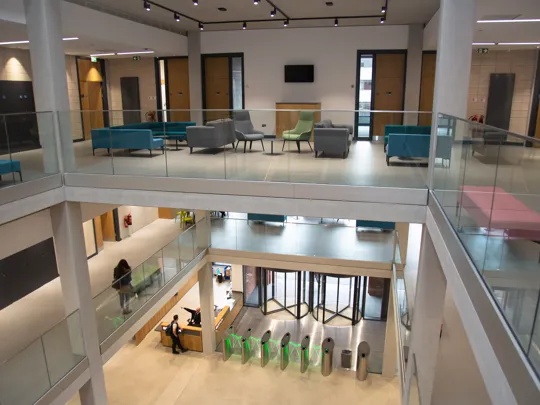
Our £44 million Moss House campus includes an exhibition space to showcase your work to assessors and prospective employers

A wide variety of learning spaces, from specialist teaching spaces and clinical skills suites to interactive group working spaces.
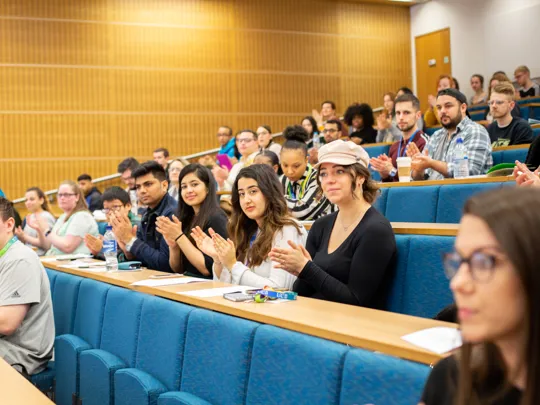
Our campus buildings feature lecture theatres equipped with the latest technology, as well as comfortable tutorial and seminar rooms and private meeting rooms

Our library facilities offer more than 50,000 print resources and over 60 million digital resources, with expert support from qualified library professionals and research specialists
Course breakdown
- Year 1
- Year 2
- Year 3
Core Modules
Mental Health and Wellbeing Across the Lifespan
This engaging module takes you on a powerful journey through the human experience - from infancy to older adulthood - examining how our mental health and wellbeing evolve over time. You’ll look into how biology, psychology, and social influences interact to shape our emotional wellbeing throughout life’s major milestones. Whether it’s the impact of puberty, parenting, relationships, or bereavement, you’ll explore how life events and Adverse Childhood Experiences (ACEs) affect mental health—and what we can do to support recovery and resilience. You’ll also gain essential insights into common mental health conditions and the range of interventions available to support individuals and communities. This is your starting point for becoming a confident, compassionate professional who understands what mental health looks like at every age—and why it matters. You’ll learn how to: • Understand key mental health challenges across different life stages • Explore how adversity, trauma, and change affect mental wellbeing • Identify early signs of common conditions like anxiety and depression • Discover how support, treatment, and resilience can lead to recovery • Begin building the knowledge and empathy that underpin person-centred care Whether you're passionate about helping children, working with older adults, or supporting community mental health, this module lays the foundation for meaningful impact.
Professional, Personal and Academic Development
This hands-on module lays the foundations for a future career in mental health and wellbeing by helping you build the habit of utilising essential skills to support others—and grow yourself. You’ll explore the roles of mentoring, coaching, and counselling, learning what makes each approach unique and when they’re most effective. Along the way, you’ll develop the core communication skills that are the heart of all helping professions. But it’s not just about others—it’s about you, too. You'll learn how to work ethically, maintain emotional safety, and reflect on your own strengths, values, and growth. With a placement opportunity built in, you’ll get to apply your learning in a real-world setting while developing your confidence and professional identity. To support your academic success, we also include tailored workshops to help you strengthen your research, writing, and critical thinking skills—so you’re ready for the demands of degree-level study. You’ll learn how to: • Understand and differentiate between helping roles in mental health and wellbeing • Practise and refine effective communication and interpersonal skills • Work ethically and safely in settings where people may be vulnerable • Reflect on your development and use feedback to grow personally and professionally • Build academic confidence in research, writing, and critical thinking • Whether you see yourself working in schools, health services, or the community, this module is your launchpad into a career where you can make a real difference.
Psychological Foundations of Mental Health and Wellbeing
Unpack the “why” behind human thoughts, feelings, and behaviour—and discover how psychology can support better mental health. What drives our emotions? Why do people react so differently to life’s challenges? And how can we use psychology to improve wellbeing—for ourselves and others? In this thought-provoking module, you’ll explore the powerful psychological theories that help explain human behaviour, motivation, and emotion. From identity and culture to stigma and self-esteem, you’ll uncover the complex factors that shape our mental health across different contexts. You’ll also gain practical tools from the world of positive psychology—including the PERMA and CHIME models—that are used to build resilience, hope, and wellbeing in everyday life and professional practice. This module also helps you strengthen your own self-awareness, giving you the insight and confidence to understand others with compassion, while working ethically and respectfully in helping roles. You’ll learn how to: • Explore key psychological theories that explain mental and emotional experiences • Understand how identity, culture, and stigma influence mental health • Apply positive psychology models to support wellbeing and personal growth • Build insight into your own emotions, motivations, and patterns of behaviour • Develop the ethical awareness needed to apply psychology in supportive settings Whether you're fascinated by human behaviour or passionate about making a difference in people’s lives, this module gives you the psychological grounding to do both.
Safeguarding, Inclusion & Ethical Practice
Protecting people. Promoting dignity. Practising with purpose. In this essential module, you’ll learn how to recognise, respond to, and prevent harm while championing inclusive, person-centred care for people of all ages. From understanding safeguarding laws and spotting early warning signs of abuse or neglect, to learning how to work ethically and collaboratively across services—this module gives you the tools to keep children, young people, and adults safe in health, education, and community settings. You’ll also explore how to support individuals from diverse backgrounds, including those who are neurodivergent, in ways that respect their identity, voice, and lived experience. Whether you’re aspiring to work in schools, housing, youth services, or mental health care, this module will shape your ability to make a real difference—safely and ethically. You’ll learn how to: • Understand key safeguarding frameworks, responsibilities, and legal duties • Recognise the signs and risk factors of abuse, neglect, and exploitation • Work in partnership with others to promote safety and wellbeing • Deliver care and support that’s inclusive, respectful, and person-centred • Navigate ethical challenges with confidence and compassion This module helps build the professional values and practical awareness that every mental health and wellbeing practitioner needs.
Core Modules
Challenging Inequality in Mental Health Practice
This powerful module asks questions about fairness, equity, and justice in mental health care. You'll explore how structural inequalities—like racism, poverty, ableism, and gender bias—shape access to mental health support, influence diagnosis and treatment, and affect outcomes for individuals and communities. You'll also examine the stigma and discrimination often faced by marginalised and neurodivergent groups. Through real-world case studies and critical reflection, you’ll begin to develop the cultural humility, advocacy skills, and inclusive mindset needed to challenge unfair systems and champion change in your future career. You’ll learn how to: • Understand how social, economic, and cultural inequalities impact mental health and access to care • Recognise and reflect on bias, stigma, and power dynamics in mental health settings • Analyse policy and practice through the lens of social justice and human rights • Develop inclusive, person-centred approaches that prioritise dignity, diversity, and empowerment If you're passionate about mental health and believe everyone deserves to be seen, heard, and supported—this module will help you become the kind of professional who makes that happen
Driving Sustainable Change in Mental Health and Wellbeing Practice
Discover the power of research to drive real change. In this module, you’ll discover how to use research evidence to drive continuous quality improvement in mental health and wellbeing. You’ll learn to investigate systems of care, identify where practice is unreliable or unsustainable, and spot opportunities for improvement. Through case studies, structured enquiry, and group activities, you’ll practice using improvement science tools to frame meaningful questions and map out areas where research could make the biggest difference. You’ll also gain valuable workplace skills such as critical analysis, problem-solving, and effective communication—skills that are highly sought after in roles across health, education, and community services. This module prepares you for Level 6 project work, where you’ll move from identifying problems to testing and evaluating improvements in practice. By the end of the module, you’ll be able to: • Problem-solve – you’ll use continuous quality improvement tools to evidence where things could be better and learn how to prioritise the changes that matter most. • See the bigger picture – by using systems thinking, you’ll understand how different parts of mental health and wellbeing support connect, why things sometimes break down, and how you can help make them more reliable. • Work ethically and inclusively – you’ll develop the awareness to consider people’s lived experiences, relationships, and cultural contexts when exploring problems and opportunities.
Community Based Mental Health and Wellbeing
Make a real difference where it counts. This dynamic, hands-on module empowers you to support mental health and wellbeing in everyday settings like schools, housing projects, youth centres, and local organisations. You’ll develop practical, creative skills to work inclusively with individuals and groups, helping to build resilience and promote wellbeing. You’ll learn how to co-create support with people, navigate and map local services, and collaborate effectively across agencies—gaining the confidence to become a community champion for mental health. Whether your passion lies in education, social care, or grassroots activism, this module equips you with the tools and experience to create positive change where it matters most. You’ll learn how to: • Engage with communities to provide inclusive wellbeing support • Collaborate with local organisations and agencies to enhance wellbeing services • Co-produce tailored interventions with service users • Map and navigate local mental health and wellbeing resources to connect people with help • Apply creative, practical approaches to fostering resilience in diverse settings.
Professional Practice and Inclusive Learning
Step into the real world and make an impact. This immersive, hands-on module offers you an incredible opportunity to undertake professional placement experience—working alongside experienced practitioners in education, health, or community settings. You’ll observe, shadow, and actively participate while building the confidence and communication skills essential for effective support roles. You’ll also develop the art of designing inclusive learning experiences that truly engage people. Using creative techniques, digital platforms, and evidence-based approaches, you’ll learn to create accessible, stimulating activities—especially tailored to support the individual needs of the people you work with. Explore key learning theories, harness feedback for growth, and discover how cutting-edge tools like AI can enhance access and participation. Throughout, you’ll reflect on your developing professional identity and practice, gaining skills that will set you apart as a capable and future-ready mental health and wellbeing practitioner. You’ll learn how to: Design and deliver inclusive, engaging activities for diverse service users Apply learning theories and use feedback to enhance your practice Use digital and creative tools—including AI—to support accessibility and engagement Reflect critically on your professional development and identity through placement experience Communicate confidently and ethically in professional settings Get ready to transform your learning into meaningful action and take your first big steps towards a rewarding career.
Technology, Safety and Digital Wellbeing
Explore the digital world through a wellbeing lens. In today’s always-connected world, technology can be both a lifeline and a challenge—especially when it comes to mental health. This thought-provoking and practical module dives into how our digital lives shape self-image, relationships, and resilience, and what that means for those working in mental health, education, or youth and community services. You’ll explore the emotional and psychological impact of being online—from social media burnout and digital stress to the power of connection and support. You’ll learn about online risks like cyberbullying, grooming, and digital exploitation, while also developing the skills to communicate safely and supportively in virtual spaces. But it’s not just about staying safe. You’ll also discover how to harness digital tools to promote inclusion, foster wellbeing, and empower vulnerable groups—including those who are neurodiverse or digitally excluded. Whether it's setting healthy boundaries, using tech to boost engagement, or designing inclusive online spaces, this module will give you the insight and confidence to be a responsible, ethical, and compassionate digital practitioner.
Core Modules
Advanced Safeguarding and Independent Advocacy
Are you passionate about social justice, human rights, and creating safer systems for vulnerable people? This dynamic module dives deep into the world of safeguarding, mental health law, and independent advocacy—equipping you with the knowledge to challenge inequality and support meaningful change. You’ll explore how services work together to protect and empower individuals, and examine how law, policy, and professional ethics shape the support people receive. From tackling real-world dilemmas in adult safeguarding to understanding the power of lived experience, this module invites you to critically reflect on how systems can include, protect, and respect every voice. Along the way, you’ll investigate different models of advocacy, learn how to navigate complex systems, and build insight into how professionals act as allies—amplifying voices that are too often unheard. Whether you see yourself working in social care, mental health, education, or policy—this module gives you the foundations to become a confident, informed, and compassionate advocate.
Leadership In Wellbeing Contexts
Curious about how leadership works in health and care settings—and how you can play a role in driving positive change? This module explores the key ideas behind effective leadership, team dynamics, and ethical decision-making in complex, fast-paced environments. You’ll learn how strong leadership supports staff wellbeing, improves outcomes, and builds inclusive, collaborative cultures. Through real-world examples and current theory, you’ll examine how innovation happens, how organisations respond to change, and how professionals communicate across boundaries. Whether you're supporting others, contributing to service improvement, or preparing for future leadership opportunities, this module equips you with the insight to understand leadership—and the confidence to engage with it meaningfully
Evidence and Enquiry Investigation
In this hands-on module, you’ll take the lead on a real improvement project that you design around an issue you care about in mental health and wellbeing. You’ll use quality improvement science to plan, test, and evaluate change in practice, while applying human-centred design to keep people’s lived experiences at the heart of your project. From mapping systems and spotting barriers, to running small tests of change and reflecting on results, you’ll gain the skills to make evidence-informed improvements that last. This module prepares you to be a practitioner who doesn’t just talk about change but knows how to make it happen—reliably, ethically, and inclusively.
Plus one option from:
Adult Mental Health
How do life experiences shape mental health—and how can support be more inclusive, person-centred, and effective across different life stages? In this module, you’ll explore how factors like trauma, substance use, ageing, and inequality influence mental wellbeing, with a particular focus on later life mental health and cognitive decline. You’ll examine how systems respond to these challenges, and consider what compassionate, tailored support looks like in practice. Alongside a 200-hour work placement, you’ll deepen your understanding of how professionals work together across health, social care, and community settings. You’ll reflect on real-world experiences and build confidence in applying inclusive approaches that value each person’s unique journey. Whether you’re working with older adults, supporting recovery, or advocating for more equitable services—this module offers a powerful lens on mental health across the lifespan.
Children and Young People’s Mental Health
What shapes young people’s mental health—and how can you make a positive difference? This module helps you explore the emotional wellbeing of children and young people across schools and other learning environments. You’ll look into key topics like trauma, resilience, early intervention, and inclusive support—building a strong foundation for understanding mental health in real-world contexts. You'll also look at how factors like neurodiversity, safeguarding, and relationships with families and professionals influence support. As part of a 200-hour work placement, you’ll put theory into practice—reflecting on your experiences and developing the insight, confidence, and compassion to contribute meaningfully to the mental wellbeing of children and young people. Whether you're planning to work in education, care, youth services or beyond, this module offers valuable knowledge for anyone supporting young minds to thrive.
The modules listed above for this course are regularly reviewed to ensure they are up to date and informed by industry as well as the latest teaching methods. On occasion, we may need to make unexpected changes to modules – if this occurs, we will contact all offer holders as soon as possible.
Entry requirements
Entry requirements
Applicants must meet one of the following:
· A-levels: Grade profile of CCC
· T-levels: Pass with a core component grade C
· BTEC: Extended Diploma or combination of smaller BTECs with an overall grade of MMM
· Access to HE Diploma: Minimum 96 UCAS Tariff points, including 15 Level 3 credits at Distinction
· Other Level 3 Qualifications: Minimum of 96 UCAS Tariff points
GCSEs:
· English Language at grade A-C / 9-4* or equivalent
If you don’t currently meet the entry requirements, you can start with our Mental Health and Wellbeing with foundation year course to build the essential skills and knowledge needed for degree-level study.
Mature students are encouraged to apply and considered on an individual basis.
Disclosure and Barring Service (DBS)
Students on both pathways are subject to the Code of Professional Conduct and Fitness to Practice Policy, together with a Disclosure and Barring Service (DBS) check. University College Birmingham will co-ordinate and fund the completion of the DBS check prior to starting the programme.
International students
Academic entry requirements: Please visit our Country Specific Information page.
Key information
Teaching and assessment
Teaching
Example of a typical teaching week (up to 12 contact hours):
· Lectures and Large Group Teaching – 6 hours
Explore key concepts in psychology, wellbeing, and social care through interactive, tutor-led sessions.
· Seminars and Small Group Tutorials – 4 hours
Engage in discussion, case study analysis, and reflection to deepen understanding and develop critical thinking.
· Subject-Related Workshops and Skills Labs – 2 hours
Practise key skills such as triage, safeguarding, communication, and intervention planning through role play, digital tools, and scenario-based learning.
You will also need to commit around 20 hours per week for independent study, including reading, placement preparation, research, and coursework.
Assessment
Estimated breakdown of assessment for this degree course:
· Coursework – 60%
Includes reflective portfolios, case studies, community project proposals, presentations, and digital artefacts.
· Practical Assessment – 40%
Includes skills demonstrations, case conferences, placement-based evaluations, and professional practice logs.
Our teaching and assessment is underpinned by our Teaching, Learning and Assessment Strategy 2015-2020.
Additional training and qualifications
As part of this programme, students have the opportunity to gain professionally recognised certifications and enrichment experiences alongside their core studies. These are designed to enhance employability and provide sector-relevant, practical skills.
Key additional qualifications include:
· Mental Health First Aid (MHFA) Youth or Adult
Accredited training that equips students to respond effectively to mental health crises and support early intervention.
· Train the Trainer Certification
Prepares students to deliver peer support, mental health awareness sessions, or wellbeing initiatives in community or educational settings.
· Co-Produced Training with Experts by Experience
Unique learning sessions developed and delivered in partnership with individuals with lived experience of mental ill-health, offering deep insight into person-centred and trauma-informed practice.
· Digital Literacy and Wellbeing Tools
Students will also gain experience with digital platforms, safeguarding technologies, and inclusive communication tools aligned with NHS digital transformation priorities.
Cost:
Most of these qualifications are included at no extra cost to students and are embedded into the programme. In rare cases where optional external certification is offered (e.g. additional MHFA levels), minimal fees may apply—but this will be clearly communicated in advance.
Tuition fees for home students
If you are a home student enrolling on a bachelor's or foundation degree course at University College Birmingham, the 2025/2026 academic year tuition fee for full-time study is £9,535. For part-time study, the fee is £4,767.50.
Tuition fees for international students
If you are an international student (or have been fee assessed as an international fee payer) and are enrolling on a full-time [Band 1] bachelor's degree course in 2025/2026, the fee for the academic year will be £16,000. If you complete a placement year, there will be an administration fee of £500 for a full year or £250 for a half-year placement.
Free £5,000 cost of living allowance
We are committed to supporting students who may be facing financial challenges due to the rise of living costs. If you are a full-time undergraduate student starting your course in February or September 2026, with home fee status and plan to pay your fees using a student loan, you’ll be eligible a £5,000* Cost of Living Allowance.
Further information and frequently asked questions can be found here: £5,000 Cost of Living Allowance
*If you are studying a two-year foundation degree, you will receive £2,000 in instalments each year of your course. If you decide you'd like to top up to a full BA or BSc (Hons) at the end of your foundation degree, you will also be entitled to the £1,000 in the third year.
Kick-Start Scheme
As a new student studying this course full-time, you will receive £300 per year through our Kick-Start Scheme (UK students only, eligibility criteria applies). This scheme will support your studies and future career by contributing to course-related materials, uniform or selected items on campus. You may also qualify for an additional £500 per year.
Find out more about the Kick-Start Scheme here.
Work placements
Work placements offer a wealth of benefits alongside your studies, helping you put your learning into practice, develop your skills and understanding of the workplace, boost your CV for your chosen career or enhance your UCAS application for higher education. Our hired@UCB team can help find the ideal placement for you.
Placement Opportunities
Placements are compulsory across all three years of the degree. They are an integral and credit-bearing component of the curriculum.
Duration and Frequency
Year 1: 40-hour introductory vocational placement.
Year 2: 200-hour placement with an observational and participatory focus.
Year 3: Final 200-hour specialised placement aligned to the student's chosen area of interest.
These placements are embedded within year-long modules and support continuous reflective learning and professional development.
Placement Settings
Students will undertake placements in diverse non-clinical mental health and wellbeing settings, such as:
- Educational institutions (e.g., schools and colleges)
- Community and youth services
- Supported housing organisations
- Local authorities
- Third-sector/voluntary organisations
- Mental health advocacy and support services
Work alongside experts in your sector
A snapshot of some of the employers we have worked with:
-
Stepway: Supporting all veterans in Civilian life
-
Anawim: Birmingham’s Centre for Women
-
Father Hudson’s Taybor House: accommodation and support for those experiencing or at risk of homelessness
-
Birmingham and Solihull Women’s Aid: support for women and children affected by domestic violence and abuse
-
Pohwer Birmingham Advocacy Hub
-
Birmingham Samaritans
This course equips students with the practical skills, cultural insight, and professional confidence to make a real difference in people’s lives. Through inclusive teaching, specialist placements, and co-produced learning, we prepare graduates to lead change and promote wellbeing across diverse, community-based settings.
Jill Nathan Senior Lecturer, Mental Health and Wellbeing
Career opportunities
The example roles and salaries below are intended as a guide only.
Mental Health and Wellbeing Practitioner
£28,247 - £32,346
Wellbeing Activator
£28,684 - £33,673
Emotional Wellbeing Practitioner
£28,684 - £33,673
Psychological Wellbeing Practitioner
£29,970 - £36,483
Recovery Outreach Worker
£26,000–£30,000
Community Inclusion Worker
£26,530–£29,114

Jill's Story
Jill has worked in frontline youth services, probation, and strategic service development giving her unique insight into the real-world impact of mental health and wellbeing support.
Meet your lecturers
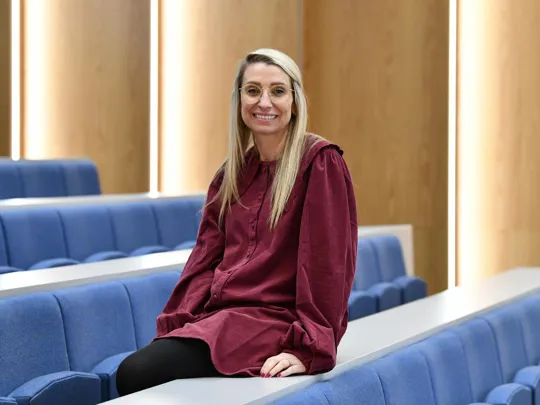

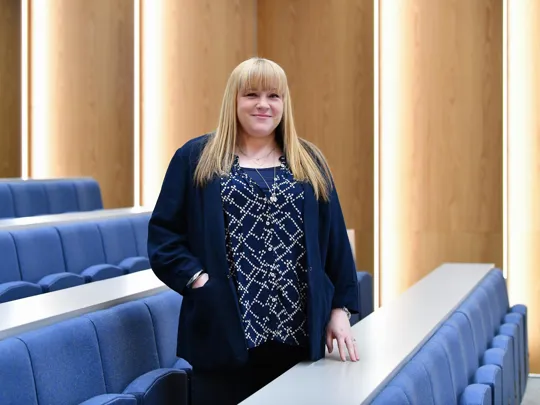
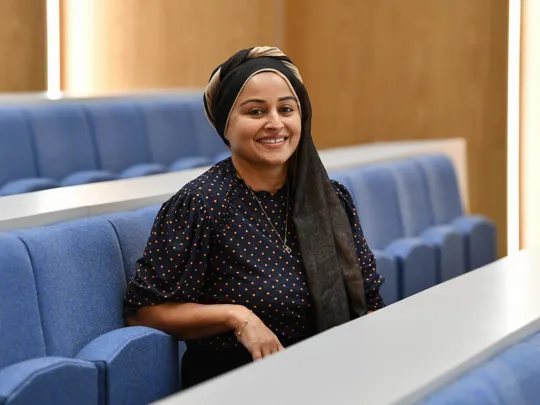

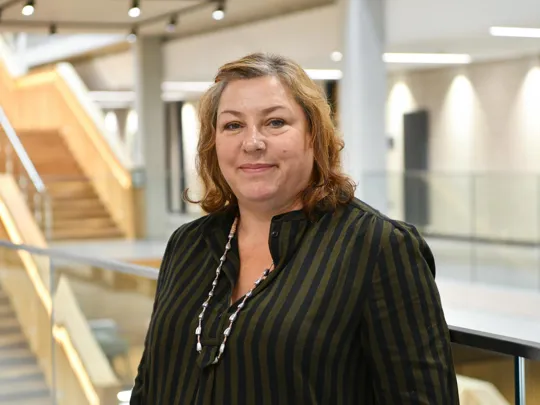

Other courses you may like
Health and Social Care BSc (Hons)
Discover how you can make a difference to the lives of many different people in their time of greatest need. This course will prepare you for working in the dynamic health and social care sector, with weekly placement experience and additional qualifications available.
